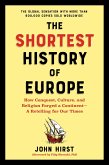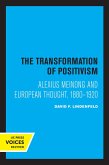If we believe in such an orderly and predetermined arrangement, the small circumstance upon which a great event may hinge becomes, in our view, but the instrumentality by means of which the great plan is operated. It by no means sets aside the vital influence of chance to assume that "all chance is but direction which we cannot see."
For instance, the believer in special providences regards as clearly providential the flight of the flocks of birds which diverted the course of Columbus from our shores to those of the West Indies; but it is none the less true that this trivial circumstance caused the great navigator to turn his prow.
Those who, on the other hand, reject the idea of special providences, and treat history as a sequence of occurrences emerging mechanically from the relations of men with one another, must admit that causes forever contend with causes, and that the nice balance of action and reaction may sometimes be influenced radically by even so small a circumstance as the cackling of the geese of Rome.
Dieser Download kann aus rechtlichen Gründen nur mit Rechnungsadresse in A, B, BG, CY, HR, DK, EW, FIN, F, D, GR, IRL, I, LR, LT, L, M, NL, PL, P, CZ, R, SK, SLO, S, H ausgeliefert werden.
Hinweis: Dieser Artikel kann nur an eine deutsche Lieferadresse ausgeliefert werden.









